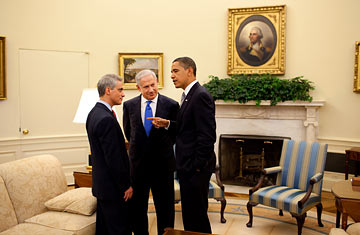
U.S. President Barack Obama, right, talks with Israeli Prime Minister Benjamin Netanyahu, center, and White House chief of staff Rahm Emanuel in the Oval Office
(2 of 2)
The intentions of Israel's leaders came under further question last week, when Prime Minister Benjamin Netanyahu's father, the historian Ben-Zion Netanyahu, told an Israeli TV interviewer that he had been told by his son that he did not support the creation of a Palestinian state. Despite Benjamin Netanyahu's having accepted the goal in principle under pressure from Washington, his father said the Prime Minister had done so only on the basis of conditions that were impossible for the Palestinians to ever accept.
Then, in an interview published on July 10, Netanyahu's national security chief and key adviser, Uzi Arad, said the Palestinians, including Palestinian Authority President Mahmoud Abbas, were not committed to living in peace with Israel. "Even the moderates among them do not really want a settlement," Arad said. "At most, they are striving toward a settlement in order to renew the confrontation from a better position." As a result of U.S. pressure, a Palestinian state of "stamps, parades, carnival [...] That could happen," Arad said. "A fragile structure, yes; an arrangement resting wholly on wobbly foundations."
Plainly, there are key voices in the Israeli leadership that are deeply skeptical of Obama's effort to move quickly to implement a two-state peace. And, of course, as the President himself constantly reminds, the window of opportunity for such an outcome is closing after two decades of fruitless negotiation.
In a little-noted speech in London on July 11, European Union foreign policy chief Javier Solana — a key figure in the "Quartet" of the U.S., E.U., U.N. and Russia that is overseeing the peace process — said that if the parties were unable to bring the conflict to an end in the very near future, the international community would have to impose a solution. "The mediator has to set the timetable too," Solana said. "If the parties are not able to stick to it, then a solution backed by the international community should be put on the table."
Solana called for a U.N. Security Council resolution outlining in detail the parameters of a two-state solution, fixing borders, prescribing arrangements for sharing Jerusalem, security and the fate of refugees. Of course, Obama is saying nothing of the sort, still hoping to drag the two sides, however reluctantly, to the negotiating table to hash out an agreement. But Solana — who has been involved in trying to do just that for a decade longer than Obama has — may simply have recognized that the U.S. pressure that has been required to get both sides simply to make confidence-building gestures is nothing compared with what will be required to get them to accept a final peace agreement.
